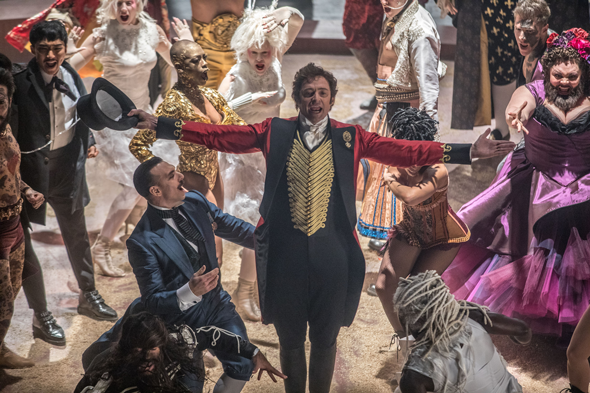
by Father John Catoir
Sweeping biographies about great leaders like Lincoln, Gandhi and Churchill are at the top of my list of favorite movies. I also love musicals. Up until recently, my favorite musical was ‘My Fair Lady.” However, ‘The Greatest Showman’ has recently moved into first place.
From the opening scene, this movie about P.T. Barnum, was a joyful celebration. Hugh Jackman, and a great cast, lit up the screen with a series of unique musical sequences. However, when I praised the movie on Twitter, a woman took me to task.
She protested, “Barnum and his circus exploited human beings as freaks, and abused animals.” I was shocked. The thought had never occurred to me.
Why was I so insensitive? Then I realized that you can’t really abuse animals, and expect them to stay under your control. I had doubts about that part of her assertion.
In the movie, the animals were shown a lot of love. On the other assertion that humans were exploited, I was perplexed. Maybe I was lulled by the fact that all the circus performers, the so-called freaks, considered Barnum to be a father figure.
They had been outcasts their entire lives, rejected by the world until he gave them a job, and a community of people who accepted them. They never had this before. They loved him, and called themselves a family.
Or, maybe I enjoyed it so much because of its message, which was about repentance and redemption. Hugh Jackman’s character, Barnum, after a tragic episode, blamed himself and made this profound statement, “It all happened because I thought I was more than I am.” The movie was a dazzling morality play, which had a profound message: “Pride goes before the fall.”
After I absolved myself, I moved onto a more philosophical question, “How should anyone judge a movie? Should we judge it based on the moral character of the leading man or woman?” No! Scoundrels need to be punished.
I loved “My Fair Lady” even though Professor Henry Higgins was an obnoxious snob, who thoroughly abused Eliza Doolittle. I loved it because Audrey gets to put Rex in his place, and because it had a happy ending. George Bernard Shaw, the author of the play Pygmalion, on which “My Fair Lady” was based, took the story from Greek mythology.
Pygmalion was an artist who fell in love with one of his marble sculptures. Miraculously, she comes to life, and begins to torment him. Alas, even the ancient Greeks had a sense of humor.
A play or a movie must be judged as a whole. The beginning, middle and the end must all be taken into consideration. At that point you can make a determination: how did this experience make you feel?
“My Fair Lady” and “The Greatest Showman” made me feel good, full of joy and elation. It was well worth the price of admission.
With all that having been said, let’s go back to the lesson, which the “The Greatest Showman” proclaimed: strive to attain the virtue of humility; respect your neighbor as you would want them to respect you; be honest enough to admit your mistakes, and do all you can to make amends.
